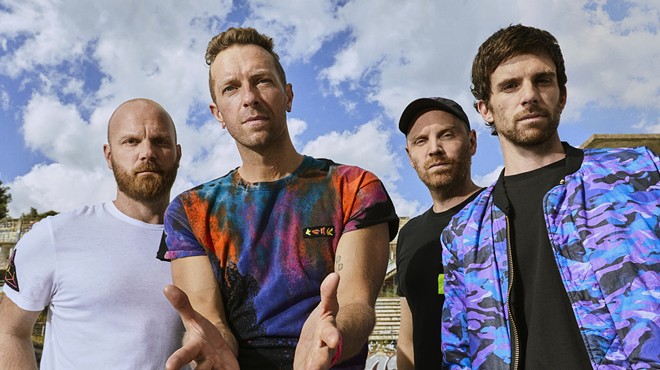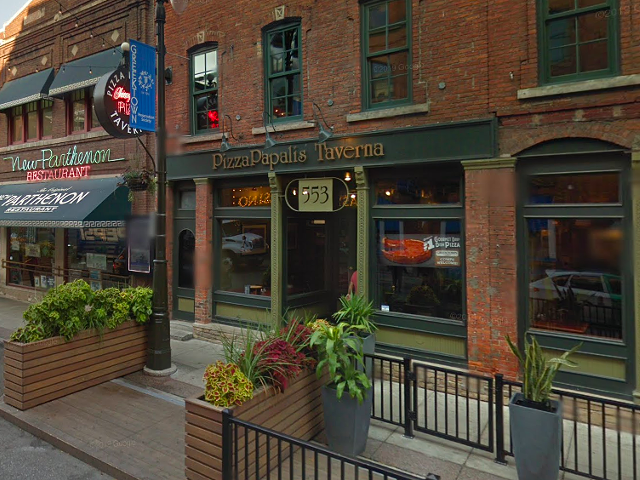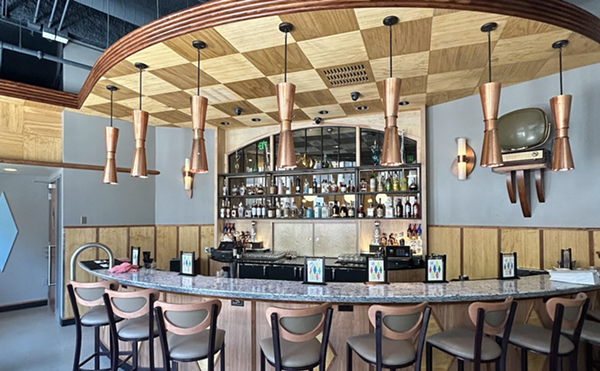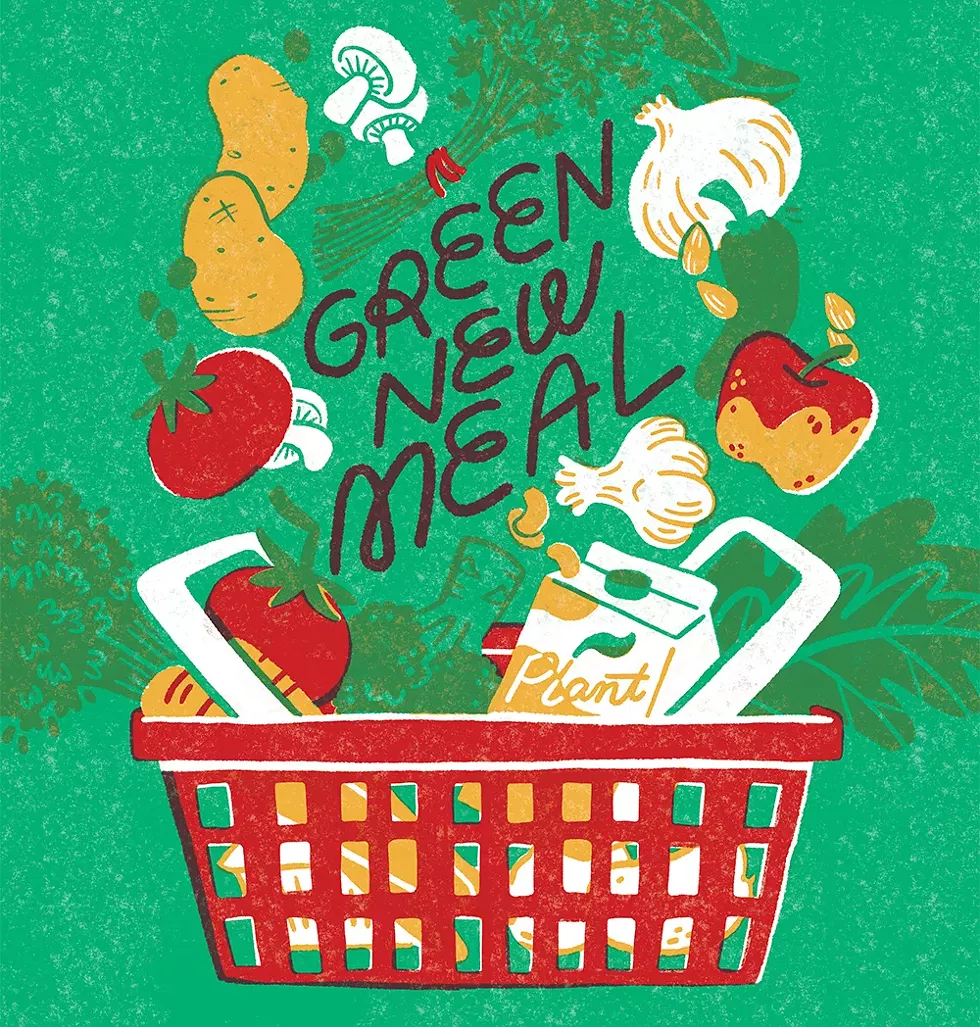
The following is excerpted from Michael Betzold's new book, The Green New Meal: What You Eat Impacts Us All, which is available now.
Through most of history, only the wealthiest or the most talented could bequeath to their offspring material or artistic treasures. Because human civilization is now at an unprecedented crossroads, anyone — rich or poor, accomplished or unsuccessful — today can leave to their children and grandchildren something of great value: a fighting chance to survive. But if you don't act very soon, you'll leave them nothing but an apocalypse.
Our gift to those who will follow us in this world requires only that we be willing to relinquish a habit that harms all inhabitants of our planet. If enough of us embrace this unique opportunity and do so quickly, we can leave behind a transformed world of more kindness. Doesn't that seem like an easy choice? So why isn't it happening? Why is the step we must take often left out of the discussion altogether?
On June 7, 2021, the Scripps Institution of Oceanography reported that the level of carbon dioxide in the Earth's atmosphere had once again hit a new all-time high — as it has every year since the institute began measuring that greenhouse gas at the peak of Mauna Loa in Hawaii in 1956.
This record CO2 level got little attention. Many media outlets didn't even report it. It elicited, at most, a collective shrug.
Isn't it remarkable that we've grown accustomed to living with the most daunting, overwhelming, frightening prospect in human history? That such signs of the impending collapse of our civilization don't even command the attention of most people? Extreme and even deadly weather events clearly caused by human-made climate disruption are now routine.
As these latest alarms went off, my partner's great-granddaughter was starting her thirteenth month of life. With every climate wake-up call, we are again jolted into clearer awareness that much of her life could be a struggle for survival in an unimaginably hellish world. That thought is intolerable. News reports continue to pass over a key aspect of the climate story. Why don't they say that despite the enormity of the threat, we each hold the power to do something to prevent catastrophe?
Our civilization is imminently endangered by global temperatures rising to unprecedented levels, with consequences so drastic they are almost unthinkable. What is rapidly unfolding now is a global climate emergency. And that's exactly how it was characterized in a report issued in October 2021 by the Intergovernmental Panel on Climate Change, a body of scientists convened by the United Nations.
The New York Times noted just how dire the IPCC's conclusions were: "Even if nations started sharply cutting emissions today, total global warming is likely to rise around 1.5 degrees Celsius within the next two decades, a hotter future that is now essentially locked in." With a climate that warm, the Times said in summarizing the report, "nearly one billion people worldwide could swelter in more frequent life-threatening heat waves. Hundreds of millions more would struggle for water because of severe droughts. Some animal and plant species alive today will be gone. Coral reefs, which sustain fisheries for large swaths of the globe, will suffer more frequent mass die-offs.
"Every additional degree of warming brings far greater perils, such as ever more vicious floods and heat waves, worsening droughts and accelerating sea-level rise that could threaten the existence of some island nations," the Times summarized the IPCC report as saying, adding that it noted that the last decade "is quite likely the hottest the planet has been in 125,000 years. "
Is the world on an emergency footing? Hardly. Many people won't even acknowledge they smell the smoke.
We're all going to suffer if enough of us don't take the recommended action. And the climate emergency is the No. 1 public health concern of all time. In terms of potential impact, it makes COVID look like a hiccup.
The full scope of the problem — the need to tackle all sources of harmful atmospheric emissions and the real and extreme urgency of the threat to civilization —is rarely explored in an honest and comprehensive way by the so-called "adults" in the room.
In 2019, at the World Economic Forum in Davos, Switzerland, 16-year-old Greta Thunberg told the gathering of global financial leaders:
"Adults keep saying: 'We owe it to the young people to give them hope.' But I don't want your hope. I don't want you to be hopeful. I want you to panic. I want you to feel the fear I feel every day. And then I want you to act.
"I want you to act as you would in a crisis. I want you to act as if our house is on fire. Because it is."
There's abundant evidence that the climate emergency is not just some vague far-off threat. In 2020, Australia and California had their worst fires in recorded history, with millions of acres of forests aflame, consuming towns, roasting people alive before they had enough time to flee through raging infernos, and threatening major population centers. Online, you can view clips from real-life disaster movies, with people barely escaping the conflagrations with their lives while losing their homes and belongings.
On July 9, Death Valley reached 130, matching the hottest verified temperature ever recorded on Earth. By July 20, there were 80 large fires in the U.S. and 200 in British Columbia. The Bootleg Fire in southern Oregon prompted evacuations and produced its own weather — towering pyrocumulonimbus clouds propelling smoke and ash 45,000 feet into the atmosphere, spawning rain and lightning and erratic winds which made firefighters temporarily retreat. In Detroit and Toronto, a blood-red sun rose through windblown haze produced by smoke from fires in Manitoba.
In the ensuing months, blistering heat waves killed hundreds of people in the United States and Canada. The Dixie Fire destroyed one town and forced thousands to flee their homes in Northern California.
We are already living in an extreme climate emergency. The magnitude of what's unfolding is an emergency affecting almost every place in the world — and it's only going to get worse unless we act on the entire problem.
Sea-level rise is already endangering the treasures of Western civilization in Venice. And many other flood-prone cities throughout the world face calamity. The low-lying nation of Bangladesh is home to 150 million people, many of them poor and already coping with frequent flooding. If the seas rise three more feet, which is sure to happen this century unless something significant changes very soon, a fifth of Bangladesh will become permanently uninhabitable, which means 30 million people will have to relocate.
Such changes are already creating millions of climate refugees. In the United States, much of the Southwest is becoming too hot and parched for human habitation, with water a scarce and expensive resource. The East Coast and Gulf Coast are increasingly plagued by hurricanes and rising sea levels, and people will soon have to move from major population centers near the sea. In coming decades, cities like Chicago and Detroit will see a massive influx of climate refugees because they still have a tolerable climate, relatively few extreme weather events, and plenty of water — at least for now.
We're not just heading toward disastrous climate change decades down the road — it's already happening. The longer we put off appropriate action in response, the more we're putting our children and grandchildren in grave peril. We're rapidly running out of time and approaching dangerous tipping points beyond which there is no turning things around — no matter what is done.
Already set in motion are several processes that if left unaddressed we can never reverse. One is the "albedo effect": white surfaces reflect sunlight, dark surfaces absorb it. As the polar ice caps melt, vast stretches of white are replaced by more dark surfaces, which absorb more heat from the sun, accelerating the warming in a self-reinforcing feedback loop.
Another unprecedented event with unknown implications is the more frequent appearance of massive methane gas bubbles in the Arctic. Huge amounts of that potent greenhouse gas have been trapped under the polar ice for centuries. The methane has already started to escape as the Arctic permafrost thaws. No one knows how much will surface and further heat the atmosphere.
Vast swathes of rainforest, which absorb carbon dioxide, are disappearing. The Amazon is the single most important safeguard on the planet against a climate catastrophe. By itself it produces 20 percent of our planet's oxygen.
Scientists don't know exactly when these "tipping points" will be reached and, if surpassed, how much heat they will add to the atmosphere. This uncertainty calls into question any estimated timeline for decisive action. We don't have the luxury to wait any longer to take effective countermeasures.
Considering there are so many unknowns, that the level of warming is unprecedented in human history and the consequences of an insufficient response so devastating, it is stunning how casually the world has so far responded.
So far, the most notable international response is the Paris Climate Accord. Even if met, its modest and fairly vague goals would not prevent further catastrophic disruption — the deadly fires, droughts, and hurricanes we've been seeing that will continue to worsen if the world sees a temperature rise between 1.5 and 2 degrees Celsius. Societies would have to accept the flooding of major cities, the displacement of population centers, and the massive migrations sure to result — as the latest IPCC report emphasized.
And a major cause of the climate emergency is not addressed at all in the Paris accord.
Jeff Anhang, a leading environmental specialist at the World Bank, notes that "the amount of renewable energy infrastructure needed to stop climate change has been estimated by the International Energy Agency to cost at least $53 trillion and take at least twenty years, by which time it's projected to be too late to reverse climate change."
The 2021 IPCC report concluded that even if all the pledges to address the climate made by all the countries to date were implemented, they would, according to the New York Times summary of the report, "result only in a 12 percent decrease in emissions by 2030 — well short of the 45 percent cut needed to keep the world on track to meet the most ambitious aims of the Paris agreement."
Over the past 30 years it's become increasingly obvious that our civilization is in dire danger — yet that approaching apocalypse is too often shrugged off or wished away. Even as it starts to overwhelm us, we can't believe the disaster unfolding right before our eyes.
Billions are being invested already in building "resilience" by using the high-tech equivalent of higher seawalls. These infrastructure "hardening" measures are often characterized as "adaptation to climate change" — extending the illusion that somehow civilization can continue in a much hotter climate (when many places are already struggling with the climate we have created).
Getting to net zero carbon emissions by 2030 or 2040 or 2050 or some other future deadline will never by itself save our civilization. That's because we have to reduce not just carbon emissions but all greenhouse gasses. How do we do that? Not just by turning down our thermostats, getting better mileage, and recycling. We've been doing those things for decades. Those actions are insufficient, because the source of much of our civilization's deadly emissions is what we eat.
According to a United Nations report, production of meat causes more greenhouse gas emissions than all the planes, trains, and cars in the world combined. The billions of ruminants we eat each year belch methane, a greenhouse gas 23 to 28 times more potent than carbon dioxide, and they excrete feces filled with nitrous oxide, which is an estimated 256 times more potent than CO2.
The World Resources Institute says we'll need a 30 percent decrease in consumption of animal foods to meet the greenhouse gas emissions targets set in Paris. That is a goal that can be met or exceeded — if we all do our part.
We all make choices every day when we sit down to eat, and we all pay a price for everyone’s choices — not just environmentally, but financially.
tweet this
Most of our farmland is used to raise crops to feed the animals we eat, much of our energy is used to transport their body parts to market, and those activities produce a huge amount of greenhouse gas emissions.
Eating animals is, by most measures, the largest single driver of human-induced climate change. And it's the one aspect of the climate emergency that we as individual consumers can affect — by choosing what we eat every day.
In addition to the direct emissions of methane and nitrous oxide, large-scale animal agriculture degrades the environment and contributes to carbon emissions in many other ways. The Amazon and other rainforests are being cut down to create land for livestock grazing and for crops to feed cattle. We're turning them from carbon sinks to carbon producers, which is worsening the crisis.
Almost all the animals we eat in the U.S. are raised on factory farms — concentrated animal feeding operations (CAFOs). Factory farms are places of torture, mutilation, and experimentation on living sentient beings. Animals live in spaces so cramped they can't turn around. They never go outside or see the sky. Animals are imprisoned, fattened up with hormones, and slaughtered as soon as they reach the optimal weight.
CAFOs are what give us the Big Mac, the KFC meal, and all the meat packaged to conceal the animals within the world's snack food.
Industrial animal agriculture is such a massive enterprise that if cattle were a country, it would be the third-largest emitter of greenhouse gasses in the world, behind China and the U.S. Eating animals at the scale we do — 80 billion a year — is a terribly inhumane, dangerous, and inefficient way of getting calories into the stomachs of human beings.
Anhang emphasizes: "Replacing animal products with alternatives offers unique dual opportunities to reduce greenhouse gas emissions quickly while freeing up land to enable more trees to capture excess atmospheric carbon in the near term. So replacing animal products with alternatives seems to be the only pragmatic way to reverse climate change before it is too late."
In fact, if everyone on Earth restricted consumption of animals to just once a week, it would equal saving the emissions from 91 billion miles of driving cars.
Most of these well-documented facts about the devastating costs of eating so many animals too often go unmentioned — or are quickly glossed over — in discussions about climate. The massive contribution of animal agriculture to our climate emergency is largely kept hidden from consumers. If we hope to preserve life on Earth, we must change our diet. Even if all other targets on carbon neutrality are met on time, if we continue as a civilization to consume animal products worldwide at anywhere near the same rate we do now, we won't keep global warming to a tolerable level; we'll be courting sure disaster. Our diet must change radically and quite soon for us to have any chance at all. But if we do take steps now to change what we consume as food, we can give our children and grandchildren a fighting chance to survive.
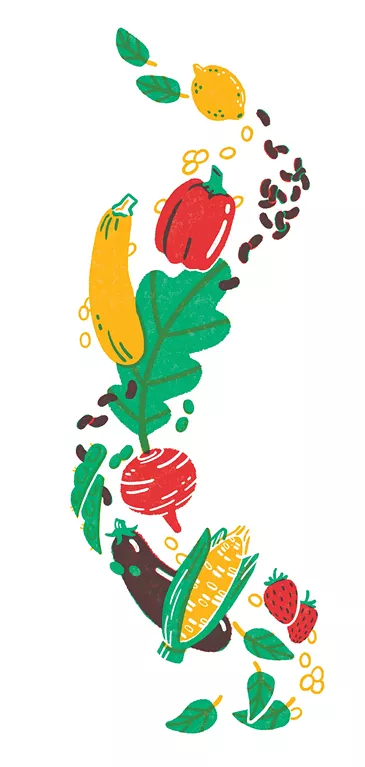
It's our duty to do so — and it's also our privilege.
We all make choices every day when we sit down to eat, and we all pay a price for everyone's choices — not just environmentally, but financially. No matter how many animal products we consume, as American taxpayers we are paying for our collective demise and the ruination of our children's and grandchildren's future — and for the torture of billions of animals and the erosion of our own health. In 2020, more than $30 billion in U.S. government subsidies went to meat, dairy, and animal feed production. Without this massive government handout, a Big Mac would likely cost about $11.
This entitlement for the meat industry makes plant-based food less competitive in price. While our government is touting its current and future investments in "green" and "sustainable" energy and infrastructure as meaningful steps to counteract the climate crisis, it's also spending billions fueling that same crisis by subsidizing meat and dairy products. Those of us who don't eat animals subsidize people who do.
In addition, governments could start to label food products with accurate figures informing consumers how what they buy contributes to greenhouse gas emissions. Now, food items must be labeled with calorie and fat content, presence of potential allergens, and other crucial dietary information. If consumers must have this information, don't they also have the right to know how much the food they buy contributes to a disastrously warming climate?
Given the urgency of our situation, we must respond to the climate emergency with all the effective means at our disposal. We ought to have policies that promote clean energy, but we also should address animal products. We need the strongest possible "Green New Deal" to make a decisive transition from fossil fuels to renewable energy. As consumers, we can help that shift by choosing electric or hybrid vehicles instead of gas guzzlers. And we can also make smarter choices about the foods we buy and eat without government policies that thwart those decisions. It all must happen if we want to save our civilization.
What's holding us back? Many prominent leaders and activists are loath to tell the whole story. The facts are easily available to anyone — just do a little Googling. But to date there's been little serious political response to the real scope and depth of the climate emergency — and a deep reluctance by many to even speak about diet as a part of the solution.
The most prominent youth-led climate activist group, the Sunrise Movement, won't touch the climate issue either — even though many of their members are vegans or vegetarians.
We can't wait any longer for politicians and corporations to act strongly enough and soon enough. In all the years since the alarm has been sounding, we've gone from turning 40 billion animals a year into food to slaughtering and consuming 80 billion land animals annually. While we're hearing political pledges about starting to control carbon emissions, we've doubled the quantities of methane and nitrogen emissions. Why sit back and hope others will act when there is something every one of us can do today that will have an immediate impact? We can start working right now on the biggest threat to our families' future. By doing so we can have an influence on others through our personal contacts, and we can help drive changes in the marketplace.
Making changes in personal habits in order to help save the environment doesn't require a new mindset. Many of us have been motivated to do such things for a long time. You probably have been recycling or turning down your thermostat or limiting unnecessary driving for many years. At first, you might have thought those were burdensome sacrifices. Now you don't give it a second thought when you put an extra blanket on your bed and turn the heat down at night.
And just as with using less fossil fuel to travel or heat your home, anything you do with your diet has a measurable impact. You can make a significant impact by choosing to not eat meat a few days a week, or by eating one plant-based meal per day.
We're in the greatest public health emergency imaginable, everyone's lives are at risk, and everyone's actions are crucial.
The greatest source of methane is animal agriculture. We can control methane by changing our diet, and doing so will reduce temperatures. If you have other agendas and concerns, eating fewer animal products won't interfere with them at all.
We are fast approaching the point of no return from a catastrophe beyond anyone's imagination. Who and what are we defending or protecting with our inaction?
Is eating animal products worth the price we are all paying — and will be paying for generations to come?
We are eating our way to mass extinction. We have both a right to choose and a right to life, and we have a rapidly narrowing window of opportunity to choose life.
Michael Betzold is a Detroit-based journalist, an early Metro Times contributor, an Emmy-winning author of ten books, and a member of the Climate Save movement.
Stay connected with Detroit Metro Times. Subscribe to our newsletters, and follow us on Google News, Apple News, Twitter, Facebook, Instagram, or Reddit.

